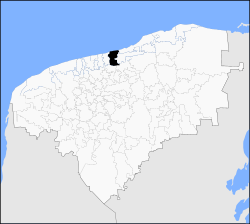Dzidzantún
| Dzidzantún | |
|---|---|
| Town | |

Municipal Palace of Dzidzantún
|
|
 Location of the Town in the State of Yucatán |
|
| Location of the Town in Mexico | |
| Coordinates: 21°14′50″N 89°2′30″W / 21.24722°N 89.04167°WCoordinates: 21°14′50″N 89°2′30″W / 21.24722°N 89.04167°W | |
| Country |
|
| State |
|
| Government | |
| • Mayor | Ismael Aguilar Puc (PRI) |
| Area | |
| • Total | 198 km2 (76 sq mi) |
| Elevation | 10 m (30 ft) |
| Population (2005) | |
| • Total | 8,119 |
| • Density | 41/km2 (110/sq mi) |
| • Demonym | Dzidzantunence |
| town | |
| Time zone | Central Standard Time |
| • Summer (DST) | Central Daylight Time (UTC) |
| Area code(s) | 991 |
| INEGI Code | 027 |
| Major Airport | Merida (Manuel Crescencio Rejón) International Airport |
| IATA Code | MID |
| ICAO Code | MMMD |
| Website | Official Website |
Dzidzantún is a town in Mexico in the northeastern Yucatan, which serves as the headquarters of the municipio or administrative unit of the Dzidzantún Municipality.
Before the Spanish conquest, the site where town of Dzidzantún now stands was located in the lands under the chieftainship of Ah Kin Chel. After the area was conquered by the Spaniards, an encomienda was established in 1549 granting Hernán Muñoz Vaquiano use over the lands in the area in exchange for his taking care of the indigenous people who lived here. Yucatán declared its independence from the Spanish Crown in 1821 and in 1825, the town was assigned to the Temax Municipality. In 1918, Dzidzantún Municipality was created with the town of Dzidzantún as the headquarters of the administration.
This town is located in the coastal region known as the northern Gulf of Mexico. It falls within the parallel 21° 12' and 21° 23' latitude north and between 88° 57' and 89° 04' west longitude and has an average height of 4 meters.
It is bounded on the north by the Gulf of Mexico, south to the cities of Temax and Cansahcab, east to the town of Dzilam Gonzalez and to the west of the town of Yobaín.
Popular Festivals
January, festivities in honor of Santa Clara.
June 10 to June 13, will celebrate the festival in honor of San Antonio de Padua, patron of the people.
August 8 to 14 August, festivities in honor of Santa Clara, patron of the people (August 11).
Run the traditional Fiesta, Tradiciones and Customs
For All Saints and faithful departed it is customary to place an altar in the place of the main house, which gives the dead the food that they liked: the traditional Mucbil Pollo, accompanied by corn atole again, and chocolate beaten with water. Regional festivals in the dance jaranas people making skills among participants.
...
Wikipedia

